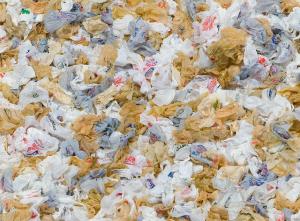
It's difficult to imagine a world without plastic bags. For most of the post-baby boom era, the light but indestructible bags found at malls, grocery stores, and convenience stores are as familiar as peanut butter and jelly sandwiches.
But plastic bags only became commonplace during the 1970s and 1980s. Our love affair with the "paper or plastic" option, however passionate, has been an extremely brief one.
Which is why I've found claims that the plastic bag is absolutely necessary a bit ridiculous.
A few weeks ago, progressives in Seattle bowed their heads in disappointment as voters shot down an initiative to pose a 25-cent tax on plastic bags throughout the city. Environmentalist lawmakers in Philadelphia also managed to lose grip on a similar bill as it fell in late August.
Though the concept isn't a new one. San Francisco proposed a similar measure in 2007 before it opted for a ban on the bags altogether; New York law requires grocery stores to sell reusable bags and provide recycling bins for plastic. All the same, the "bag tax" has sparked a remarkable amount of controversy in cities across the U.S.
There have been multiple arguments posed against a bag tax, many of which focus on the economic impact that such a measure might have on society’s less opulent. Opponents, led largely by interest groups like the American Chemical Council, argue that a tax on plastic bags would effectively mean a tax on the poor. Reusable shopping totes are expensive, they claim, and charging a quarter per bag could marginalize individuals on fixed incomes during an already tough economy.
While it's true that reusable totes have become something of an expensive fashion trend in recent years, basic bags can be purchased at grocery stores for often less than one dollar. The cost of purchasing a few of these bags would offset the 25-cent bag "tax" in only a few shopping trips.
The idea that a bag tax would cripple an already slowing economy is an argument that has been used across the board to support dying industries. In order to preserve jobs, the argument goes, citizens should support ineffectual and outdated technologies and products, many of which harm the environment.
What is rarely considered is that many of these dying industries and products could be revised into new upstart sectors that would provide new jobs and career opportunities. The plastic bag has had its run; it's time for consumers to move on.
The simple truth is this: by abandoning the plastic bag, big cities can lead the way toward a greener consumer mentality. If opponents are concerned about the economic impact that taxes or bans might have on the city’s poor, then legislators might consider initiating a program where individuals can donate reusable bags for distribution to low-income areas. Grocery stores can work together with reusable bag manufacturers to negotiate lower prices for bags to reduce the impact felt by cost-conscious consumers.
Creative solutions have yet to be examined in this debate over plastic. If lawmakers reconsider a tax or ban on this plastic, then a cleaner future will be in the bag.

